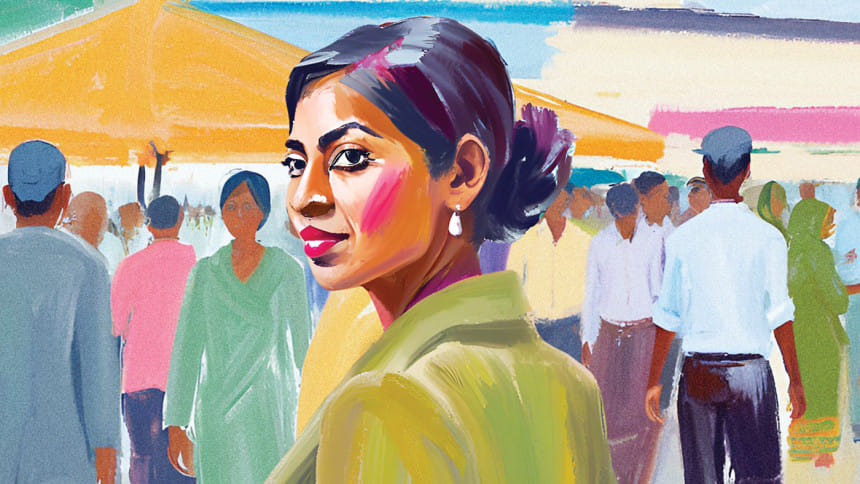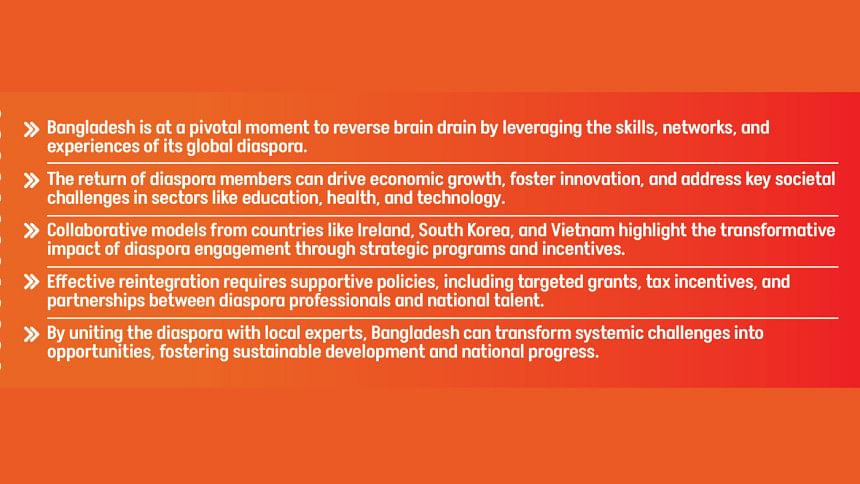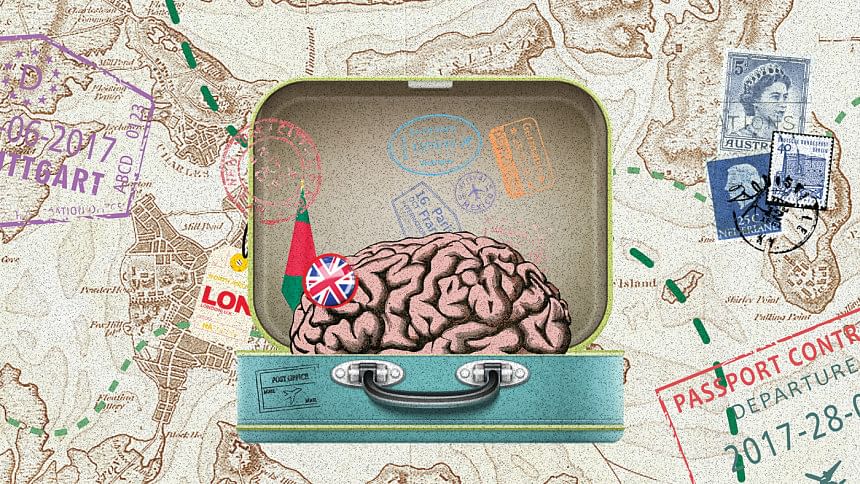From brain drain to brain gain: Revitalising Bangladesh through diaspora and national engagement

"Even if they call me away, my heart will always remain in my motherland," echoes Kazi Nazrul Islam. The voice of Bangladesh's most revered poet resonates across generations, capturing the deep-rooted sentiments of the diaspora who yearn to return and contribute to their homeland. Bangladesh, the world's eighth-most populous country, boasts a rich cultural heritage and a resilient history.
Now, fifty-three years post-independence, Bangladesh stands at a pivotal crossroads, poised to reverse the historical trend of brain drain that has been driven by the pursuit of higher education, superior healthcare, enhanced career prospects, and improved living conditions. With the nation experiencing robust economic growth and expanding its international influence, the call to reverse the brain drain grows louder.
As such, the power of the diaspora's return signifies an opportunity to make a profound impact and find personal fulfilment by applying global experiences to foster development in our motherland.
Economic potential and the power of the diaspora's return
Bangladesh's economy, with an average annual GDP growth rate of over 6% for the past decade, has evolved from a primarily agrarian base to a centre for manufacturing and services. Celebrated for the dynamic talent and entrepreneurial spirit of its nationals, the country also prides itself on primary industries like the Ready-Made Garments (RMG) sector. Recently, the burgeoning startup ecosystem has emerged as a testament to the nation's economic potential. Supported by both homegrown and returning talent, these enterprises are at the forefront of this economic transformation.
Beyond economic successes, the return of the diaspora has a transformative impact on Bangladesh's social and developmental sectors. This reverse brain drain strengthens various facets of national progress, including education, mental health, and cultural representation. By uniting diaspora expertise with that of national experts, we can address pressing social and developmental needs. With each diaspora member who returns or chooses to engage from afar, Bangladesh gains momentum toward its vision of resilience and self-sustained growth.
Personal reflections
Many expats will agree with the claim that returning to Bangladesh comes with its own set of challenges. Diaspora members often express concerns over quality of life issues that differ significantly from those in more developed countries. These include, but are not limited to, traffic congestion, environmental pollution, and varying standards of living. Additionally, concerns about safety and the integrity of the justice system, where inefficiencies and corruption may prevail, pose significant apprehensions.
However, these challenges also present opportunities for impactful contributions. By addressing these pervasive quality-of-life issues, returnees and national experts can drive progress and foster innovation, ultimately enhancing daily living conditions and paving the way for broader societal benefits. This narrative is not unique to Bangladesh; many nations have successfully overcome similar challenges through targeted policy shifts and supportive programs designed for their returning diaspora to work with national talent.

Fostering collaborative solutions through national and diaspora expertise
The combined expertise of national and diaspora talent has driven innovation in countries like Ireland and South Korea, demonstrating how returning diaspora can effectively fuel technological and economic growth. In Bangladesh, similar collaborations can address key challenges in urban planning, public health, and education reform, bringing in new perspectives and advanced skills.
Ireland's 'Global Irish' strategy revitalised its economy by encouraging knowledge exchange and reintegration. Programs like the Irish Knowledge Transfer Partnership linked diaspora professionals with local businesses, fostering advancements in technology and management. South Korea's 'Brain Return 500' program attracted skilled professionals by offering financial incentives, research funding, and housing support, strengthening sectors like IT and manufacturing. These strategies anchored South Korea as a high-tech leader.
Emulating such models, Bangladesh could maximise national growth by developing programs that connect diaspora and national experts to work on scalable solutions. Together, they can create a robust ecosystem that drives economic and social advancement.

Enhancing reintegration with robust policy support
Effective reintegration of diaspora in the Philippines and Vietnam shows the impact of strategic policies that incentivise returnees to invest in their home economies. The Philippines' 'Balik Scientist' program offers returning scientists tax incentives, funding, and research grants, making it easier for them to contribute to local innovation. Special Economic Zones (SEZs) further attract returning Filipino professionals, supporting new enterprises with tax breaks and simplified business processes.
Likewise, Vietnam's 'Vietnam Innovation Network' has encouraged Vietnamese professionals to invest in the country's development by offering grants and subsidies, especially for startups in the tech sector. This initiative has spurred a thriving entrepreneurial scene and bolstered the country's digital transformation.
Bangladesh could adopt similar policies, like SEZs and targeted grants for diaspora-led startups, to attract global citizens to return. Such programs would facilitate productive partnerships with national experts, ensuring that Bangladesh benefits from the talent and experience of its diaspora for sustainable national growth.
A call to action for a collective future
As Kazi Nazrul Islam evoked, our hearts forever remain tied to our motherland. Inspired by nations that have harnessed diaspora expertise for national development and motivated by the personal stories of returnees, Bangladesh stands on the cusp of a significant transformation.
It is imperative for more diaspora to reconnect with their roots whether by returning, investing, or engaging from afar. Contributing to Bangladesh's future doesn't necessarily require relocating; it can also mean forging stronger ties with national organisations, lending expertise to nurture various ecosystems, collaborating with different sectors to stimulate growth, and promoting Bangladesh's potential and accomplishments on the global stage. By integrating diaspora knowledge and resources with national talent, Bangladesh can transform systemic challenges into substantial opportunities, weaving a narrative that honours our rich heritage and ensures a thriving future for all.
For those among us who have the opportunity to return, doing so can make a transformative impact. By relocating to Bangladesh, you bring not only your skills and knowledge but also your global networks and resources that can significantly enhance the local infrastructure and educational systems. Your return serves as a beacon of innovation and confidence, inspiring both national and global Bangladeshis to engage more deeply with our homeland's development. The physical presence of diaspora members in Bangladesh fuels a powerful exchange of ideas and cultures, strengthening the bonds between global and national communities and contributing to a more vibrant society.
Whether near or far, our hearts beat in unison with the rhythms of Bangladesh. Each one of us carries a piece of our homeland within us, a token of its culture, its challenges, and its undying spirit of resilience. As we stand at this pivotal moment in our country's history, let us unite in our efforts to cultivate a prosperous future. Together, through the synergy of returned diaspora and national talent, we can transform our shared dreams into reality, ensuring that the story of Bangladesh continues to be one of triumph and enduring prosperity.
Amreen Bashir is a policy specialist working at the intersection of technology, mental health, education, and policy, driving innovation at the nexus of sustainable development and global collaboration.

 For all latest news, follow The Daily Star's Google News channel.
For all latest news, follow The Daily Star's Google News channel. 



Comments